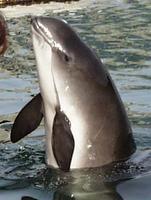|
| Query: cephalopod | Result: 117th of 169 | |
Phocoena phocoena, Harbour porpoise

| Resolution: 284x376
File Size: 23215 Bytes
Upload Date: 2008:02:10 18:49:00
|
CMS: Phocoena phocoena, Harbour porpoise
: Most harbour porpoise groups are small, consisting
of less than 8 individuals. They do, at times, aggregate into large,
loose groups of 50 to several hundred animals, mostly for feeding
or migration (Jefferson et al. 1993). Harbour porpoises are not
generally found in close association with other species of cetaceans
(Read, 1999).
Reproduction
: Most calves are born from spring through mid-summer
(Jefferson et al. 1993). The majority of female harbour porpoises
in Denmark and the Bay of Fundy become pregnant each year and are
simultaneously lactating and pregnant for much of their adult lives.
In contrast, female porpoises in California do not appear to reproduce
each year (Read, 1999 and refs. therein).
Photo: B. Culik
Food
: Harbour porpoises eat a wide variety of fish and cephalopods,
and the main prey items appear to vary on regional and seasonal
scales (Jefferson et al. 1993). In the North Atlantic, harbour porpoises
feed primarily on clupeoids and gadoids, while in the North Pacific
they prey largely on engraulids and scorpaenids. Squids and benthic
invertebrates have also been recorded, the latter considered as
secondarily introduced (Reyes, 1991 and refs. therein). Individual
prey are generally less than 40 cm in length and typically range
from 10cm to 30cm in length (Read, 1999). Dives to at least 220
m have been recorded via telemetry (Bjorge and Tolley, 2002).
|
^o^
Animal Pictures Archive for smart phones
^o^
|
|